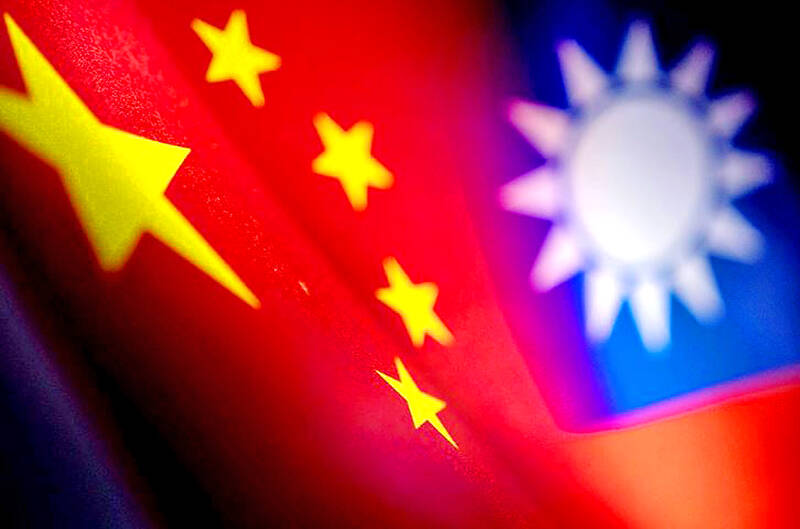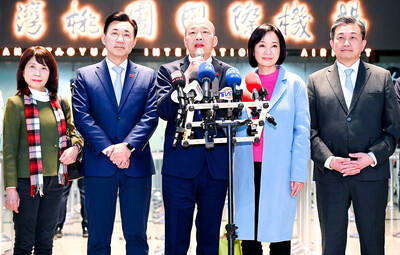China might use methods of mass coercion against Taiwan to force it to cede to its demands without the need for conventional warfare, the American Enterprise Institute said in a report on Monday last week.
“The US must recognize the possibility and danger of a coercion campaign that is far more intense than the one currently ongoing against Taiwan and develop ways to prevent Taiwan’s isolation through means short of war,” the Washington-based think tank said.
The report studies a potential strategy that Beijing could employ in a bid to force Taiwan to capitulate by engaging in an “anti-separation” strategy, tackling the issue on four fronts: opposing Taiwan-US cooperation; eroding Taipei’s ability to operate, cyberwarfare and disinformation.

Photo: Reuters
These tactics would involve convincing Taiwanese and Americans that cooperation would lead to escalation, eroding the government’s ability to provide essential services through air and sea closures, extensive and persistent cognitive warfare to break the will to resist among Taiwanese and campaigns to decrease support for Taiwan among the US public and officials, the report said.
Radio Free Asia on Friday last week said that China would likely ramp up its “united front” efforts against Taiwan over the next four years with President William Lai (賴清德) in office, with the aim of obstructing the international community’s support for Taiwan.
Beijing would aim to force Taiwan to accept a “peace process” or “unification agreement” by 2028, Radio Free Asia said.
Dan Blumenthal, author of the report and senior fellow at the institute, said that the US and its allies are too focused on deterring or repelling a military conflict with the Chinese People’s Liberation Army, while ignoring “non-war threats” from China.
The US and its allies must soon change focus and take aim at Chinese coercion, the report added.
“The US, Taiwan and a global coalition of states are entirely capable of developing adequate countermeasures to deter and defeat a PRC [People’s Republic of China] coercion campaign targeting Taiwan through immediate action and close coordination,” it said.
“We recommend that Taiwan develop the capability to counter a wide range of PRC coercive actions aimed at decreasing ROC [Republic of China] governmental capacity and the Taiwanese public’s desire for autonomy,” it added.

TRAGEDY: An expert said that the incident was uncommon as the chance of a ground crew member being sucked into an IDF engine was ‘minuscule’ A master sergeant yesterday morning died after she was sucked into an engine during a routine inspection of a fighter jet at an air base in Taichung, the Air Force Command Headquarters said. The officer, surnamed Hu (胡), was conducting final landing checks at Ching Chuan Kang (清泉崗) Air Base when she was pulled into the jet’s engine for unknown reasons, the air force said in a news release. She was transported to a hospital for emergency treatment, but could not be revived, it said. The air force expressed its deepest sympathies over the incident, and vowed to work with authorities as they

A tourist who was struck and injured by a train in a scenic area of New Taipei City’s Pingsi District (平溪) on Monday might be fined for trespassing on the tracks, the Railway Police Bureau said yesterday. The New Taipei City Fire Department said it received a call at 4:37pm on Monday about an incident in Shifen (十分), a tourist destination on the Pingsi Railway Line. After arriving on the scene, paramedics treated a woman in her 30s for a 3cm to 5cm laceration on her head, the department said. She was taken to a hospital in Keelung, it said. Surveillance footage from a

BITTERLY COLD: The inauguration ceremony for US president-elect Donald Trump has been moved indoors due to cold weather, with the new venue lacking capacity A delegation of cross-party lawmakers from Taiwan, led by Legislative Speaker Han Kuo-yu (韓國瑜), for the inauguration of US president-elect Donald Trump, would not be able to attend the ceremony, as it is being moved indoors due to forecasts of intense cold weather in Washington tomorrow. The inauguration ceremony for Trump and US vice president-elect JD Vance is to be held inside the Capitol Rotunda, which has a capacity of about 2,000 people. A person familiar with the issue yesterday said although the outdoor inauguration ceremony has been relocated, Taiwan’s legislative delegation has decided to head off to Washington as scheduled. The delegation

Another wave of cold air would affect Taiwan starting from Friday and could evolve into a continental cold mass, the Central Weather Administration (CWA) said yesterday. Temperatures could drop below 10°C across Taiwan on Monday and Tuesday next week, CWA forecaster Chang Chun-yao (張竣堯) said. Seasonal northeasterly winds could bring rain, he said. Meanwhile, due to the continental cold mass and radiative cooling, it would be cold in northern and northeastern Taiwan today and tomorrow, according to the CWA. From last night to this morning, temperatures could drop below 10°C in northern Taiwan, it said. A thin coat of snow